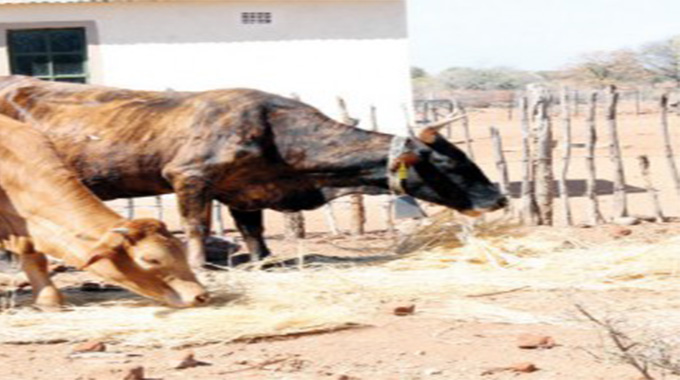Smallholder farmers hard hit by cattle losses

Sikhulekelani Moyo, [email protected]
FOLLOWING the outbreak of a “strange” livestock disease in Mberengwa District, Midlands Province, and in Esigodini, Matabeleland South Province, subsistence farmers have been the hardest hit as they have lost not only their livelihoods, but a great part of their lives as well.
Cattle are a source of income for many farmers, with some selling their livestock to pay school fees and others selling them to buy food for their families.
In many instances, farmers invested in cattle to lock up funds, which were useful during times of need.
Many people in rural areas do not have medical aid or funeral policies, when they get sick or are injured or if someone dies, they sell cattle in order to get quick money to respond to those emergencies.
Sometimes, subsistence farmers don’t need to sell their livestock, but do barter trading with their cattle in exchange for some goods or services.
Some use cattle to do odd jobs like fetching firewood and water as the cattle pull scotchcarts.
Others use cattle for ploughing during planting seasons.
During the hyperinflation period between 2007 to 2009, people in Mberengwa exchanged cattle for food such as maize meal and other basic items.
This helped many as products were unavailable in shops and money was scarce.
Livestock also provides a source of fertiliser through manure.
However, the whole system has been affected by the ongoing deaths of thousands of cattle, which has left some farmers without a single cow.
Small-scale farmers have been squeezed into a corner and are losing hundreds of cattle to theileriosis better known as January disease.
The outbreak, which started last year in January has left the area with very few cattle.
For almost a year and half now, farmers have been living in what seems to be a bad dream that they wish they could one day wake up from.
The reality, however, is that it isn’t a dream, but that their wealth is slowly vanishing right before their eyes, and there seems to be nothing they can do to stop it.
Everyday, they watch their herds dwindle one by one and despite spirited efforts to follow the local veterinarian’s instructions to the tee, they still watch their cattle vanish.
One of the farmers from Mberengwa West, Ward 13, Mr Vincent Bhebhe, who lost all his cattle, said traditionally, a homestead with an adult man should have cattle.
“We used to wake up early in the morning to go and check our kraals and see if everything was okay. Now that we don’t have anything, we tend to forget that there’s nothing in those kraals and you will get back to your senses after realising that the kraal doesn’t have any fresh dung,” he said.
“Having cattle at home is not just a symbol, but it helps in times of need. There’s a very serious drought this year, we didn’t get anything from the fields and people used to sell some of their livestock to sustain themselves during hard times. What will happen now?”
Chief Director for Veterinary Services, Dr Pious Makaya recently said dipping remains the most effective control for tick borne diseases.
He said the Department of Veterinary Services has managed to control further spread of January disease.
However, he said, they continue to receive deaths of cattle in endemic areas and farms.
It’s not just diseases that affect livestock. There are other issues, which include stock theft, that has also seen some subsistence farmers losing all their savings to rustlers. The issue, which has become of national concern, is affecting all provinces, with thieves slaughtering cattle in bushes and sometimes taking live animals, rebranding them and selling them.
Areas such as Gwanda in Matabeleland South don’t have enough pastures, therefore their cattle are left in the bushes for days, enabling rustlers to take advantage.
A widow, Ms Judith Moyo (76) from Mafuku Village in Gwanda said when her husband died about eight years ago, he left her with more than 15 head of cattle, which she thought would sustain her.
However, this was not to be, as her cattle were stolen from the grazing area.
“Bayadelela ngoba bayazi akusela baba laph’ ekhaya (They’re disrespectful because they know we no longer have a man here,” she said.
“One by one, my hope was taken away from me and with this drought I don’t know what will happen to me because I used to sell at least one beast to sustain me if there was a need.”
Rustlers are now slaughtering cattle in bushes and selling to individuals and butcheries in different cities. Working closely with locals, police have escalated the fight against the criminals, amid growing concerns that the stolen meat finds its way to Bulawayo markets and sold cheaply at some butcheries and on the streets.
So daring are the cattle rustlers that in some instances, they leave evidence in the form of cow bells, heads, hooves, and ear tags, where they would have slaughtered the stolen animals.
Cases of stock theft are rampant across Zimbabwe with rustlers hitting farmers hardest in border areas, where they work with cross-border syndicates to steal livestock. On average, between 5 000 and 10 000 cases of livestock theft are reported each year in the country, according to the Zimbabwe Republic Police Anti-Stock Theft Unit.
The unit has over the years intensified its campaigns, deployments, and community-based initiatives to fight animal theft, which is causing huge losses to farmers, and high levels of anxiety in communities that have built their herds over the years. -@SikhulekelaniM1










Comments